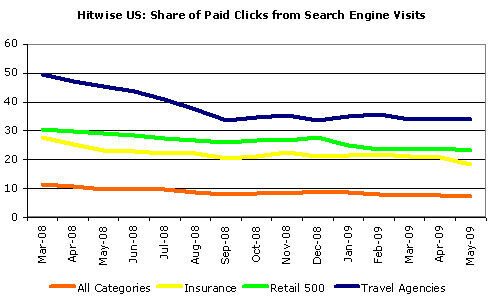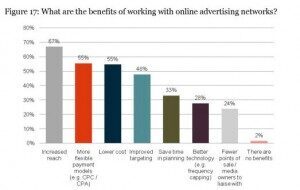The battle between PPC and SEO for online marketing budgets is an old one; some SEM agencies declare their allegiance to one or the other early on and refuse to consider blurring the lines, while others prefer a flexible approach and incorporate both in their marketing strategies. But even flexible search marketing agencies battle to find a balance between SEO and PPC, especially with clients who want more bang for their buck. Then Hitwise came along with proof that PPC is on a decline while organic search and social networks pick up the lion’s share of traffic. What is an online marketer to do?
According to Hitwise, there was a 26% decline in paid clicks for the four weeks leading up the 9th of May, 2009 compared to the same period in 2008. The data covered all industry sectors.

But rumours of PPC’s imminent decline have been reported for years. The rising cost of ads has been cited as one reason behind its decreasing popularity, as has the increase in words used per search. The days of the two-word search query seem to be behind us as smarter, more results driven internet users expand their longtail to five words or more. These days, of course, we have another culprit. The big bad recession has no doubt played some role in PPC’s decline, as companies abandon short-term thinking and embrace (less expensive) solutions that are sustainable over the long-term.
The murky water of paid advertising is further muddied by Google’s venture into display advertising. Google bought ad exchange company, DoubleClick, last year, and since then the search marketing industry has waited in breathless anticipation for something big from the corporation the doeth no evil. And it’s finally delivered an ad exchange system that Google Vice-President, Neal Mohan, says will ‘… grow the overall display advertising pie”.
Apparently, the Google/DoubleClick Ad Exchange system is based on three principles: simplifying the whole display ad process, improving advertising performance and levelling the display ad playing field so that everyone can participate.
Yahoo! and Microsoft already have established ad exchange programmes in place, which means that Google has some catching up to do before it can claim to make any kind of difference to the paid advertising landscape. But the Big G is confident in its system which allows for ‘real-time bidding’, which means that if your site offers advertising space, you can monitor bids as and when they happen and choose proposed ads based on quality, relevance and even potential profitability. Trial runs have proven successful but Yahoo! isn’t particularly worried, instead, it claims to welcome the competition. Yahoo! Vice-President for North American marketplaces, Frank Weishaupt, says, “We are very confident in our capabilities. We will continue to innovate and do our best to control our own destiny.”
Display advertising is the topic de jour, as E-consultancy has also just released the findings of its Online Advertising Survey Report (in association with The Rubicon Project). Last year, the online advertising market was estimated to be worth around £300m and was expected to grow by 10% in 2009. That’s a fair chunk of change and advertising networks are snatching an increasingly large portion. 44% of respondents are spending a greater percentage of their online display advertising budgets on ad networks. One of the most important reasons cited for the growth was increased reach to target audiences. Other important reasons include flexible payment models, lower cost (both especially convenient in a recession) and improved targeting.

Amidst all of this paid advertising turmoil, organic search continues its relentless progress, delivering long-term, cost-effective results and staying largely out of the limelight. However, its low profile is no reason to discount it relevance or effectiveness in the modern search market. As Aesop so famously pointed out, slow and steady wins the race, but if you’re of a gambling persuasion, why not spread your bet. No one ever said that the hare didn’t finish, and there’s a lot to be said for fast action, provided you manage it properly.
The wise online marketer would do well to consider all search avenues, be they paid or organic. With more advertising options creeping into the search industry a flexible approach has more value now than ever before.
[Editors note: This blogpost is part of the SEO Chicks ‘recruiting new bloggers’ competition, to vote for this blogpost go here]



